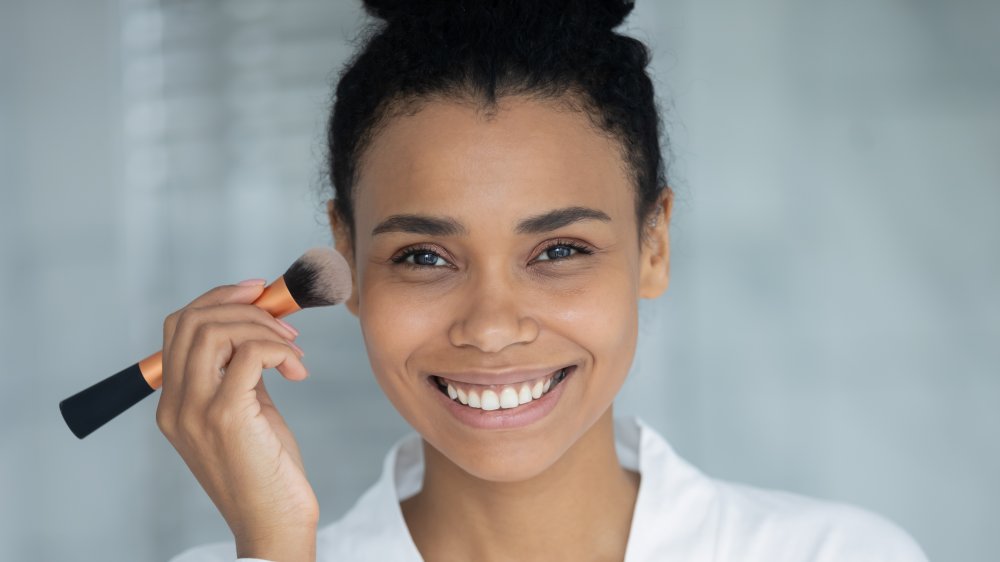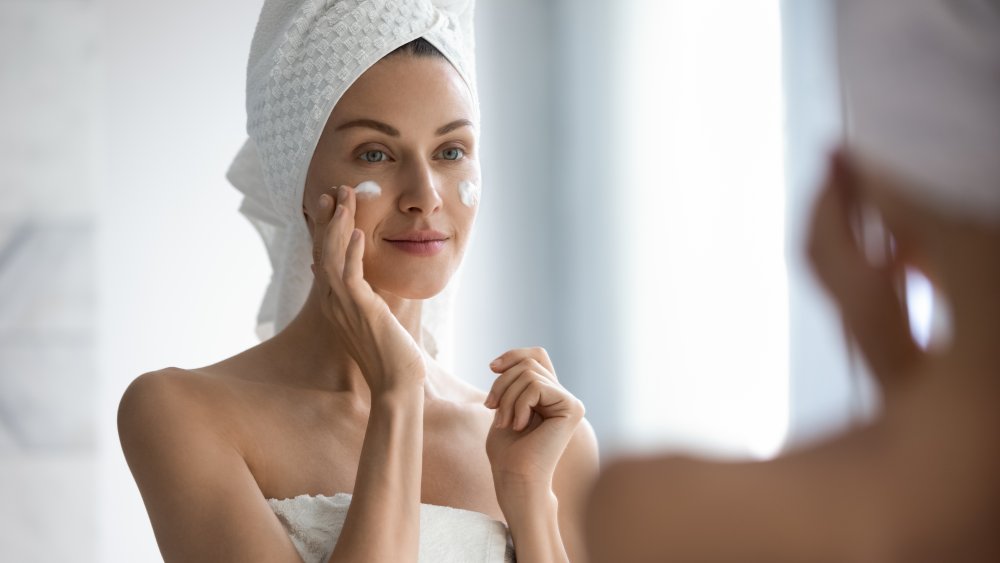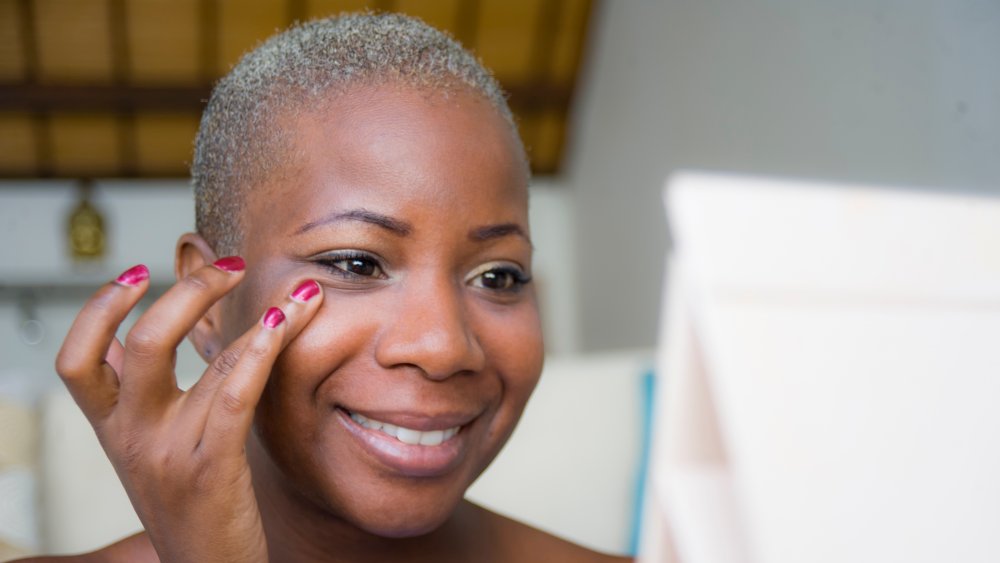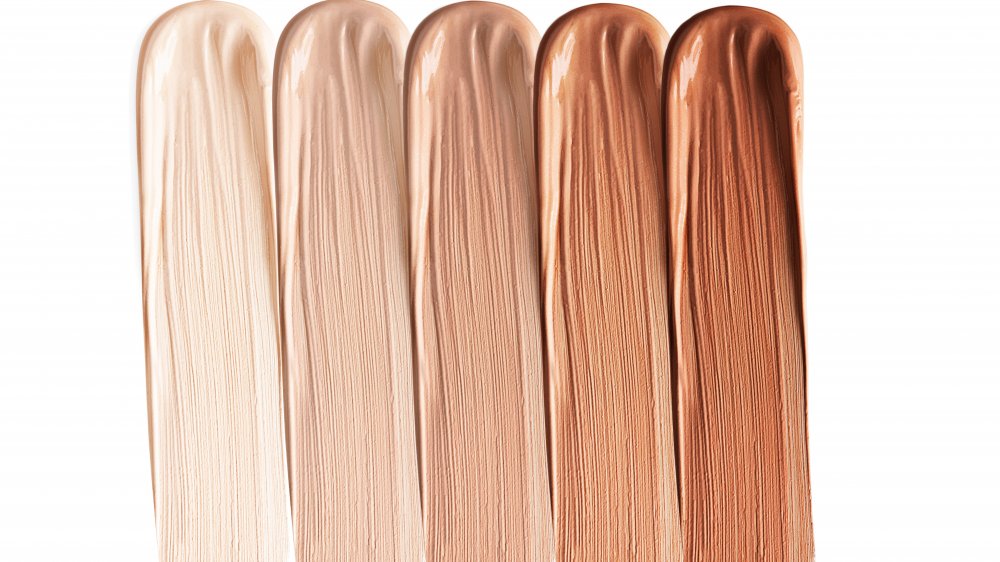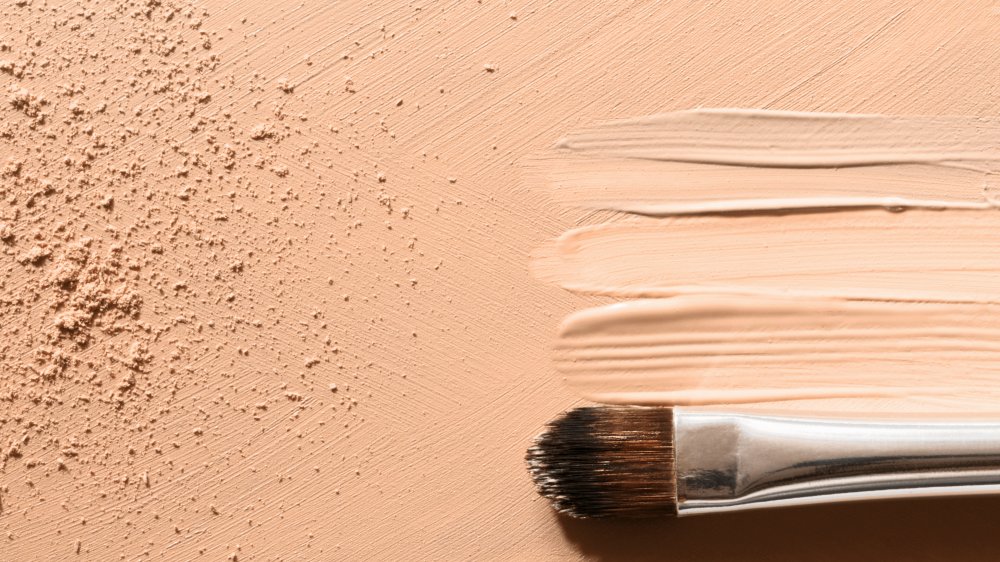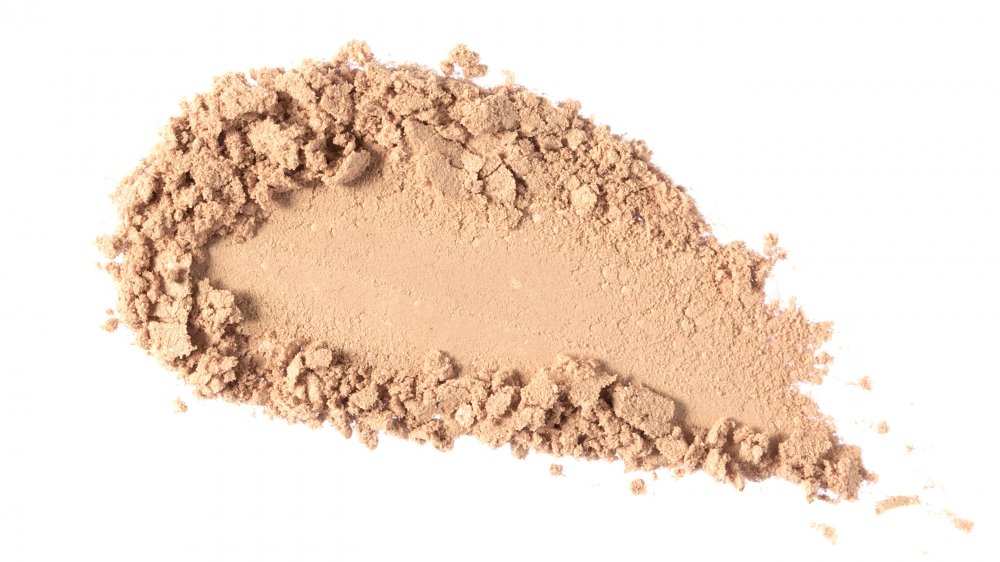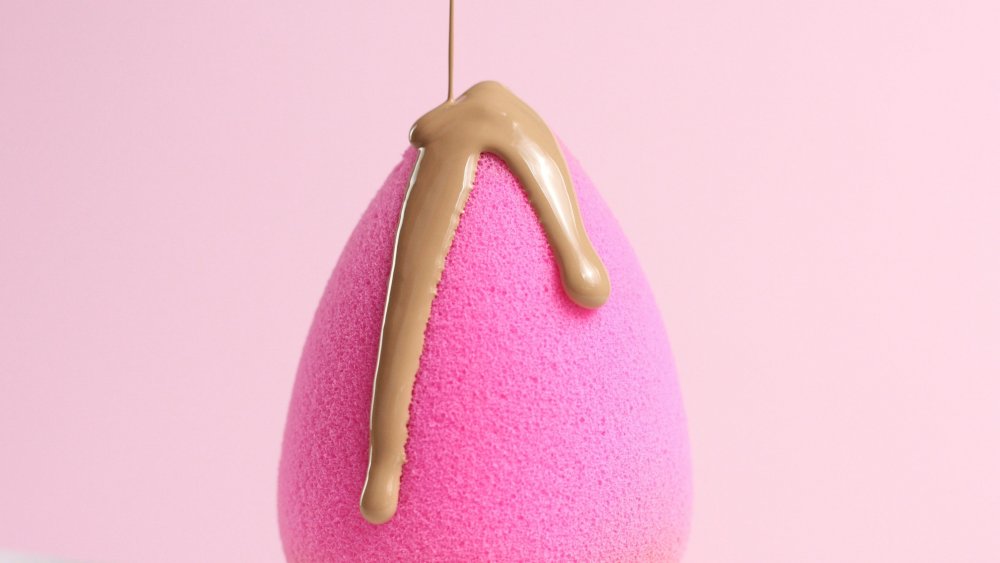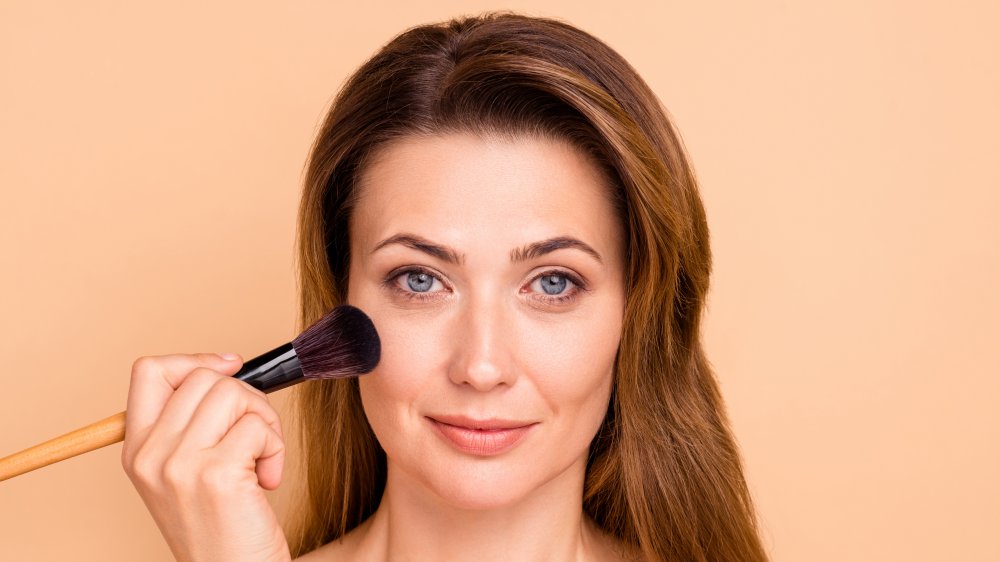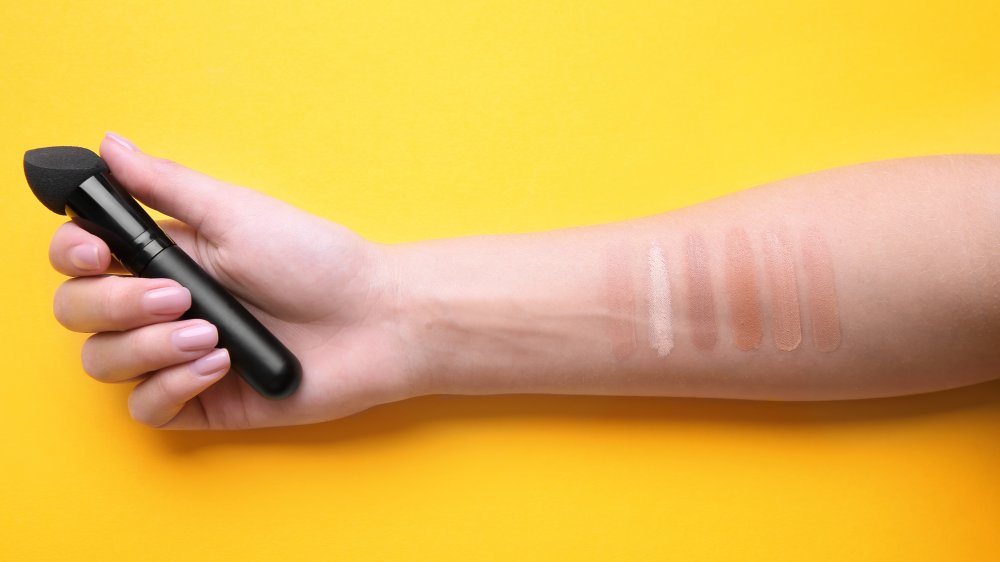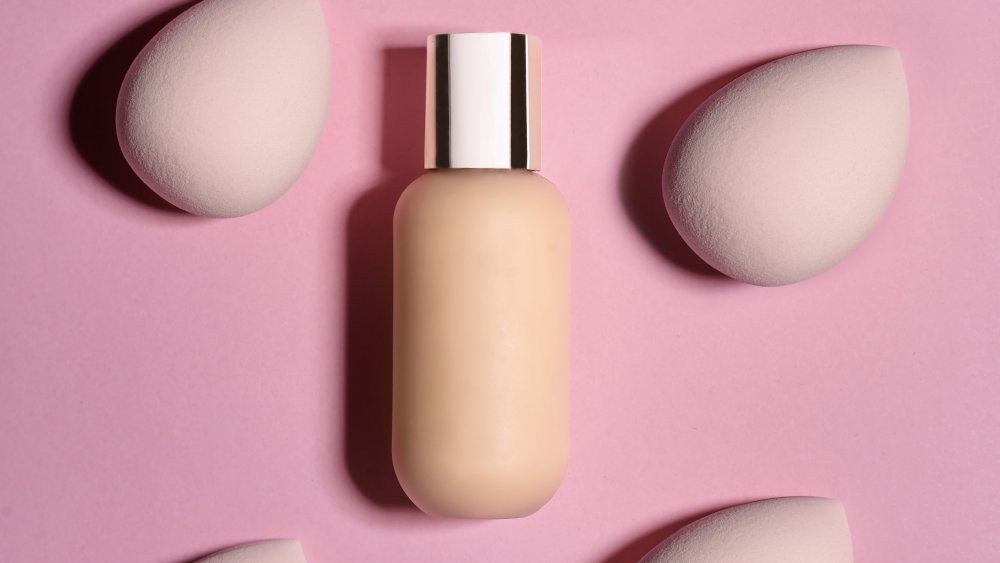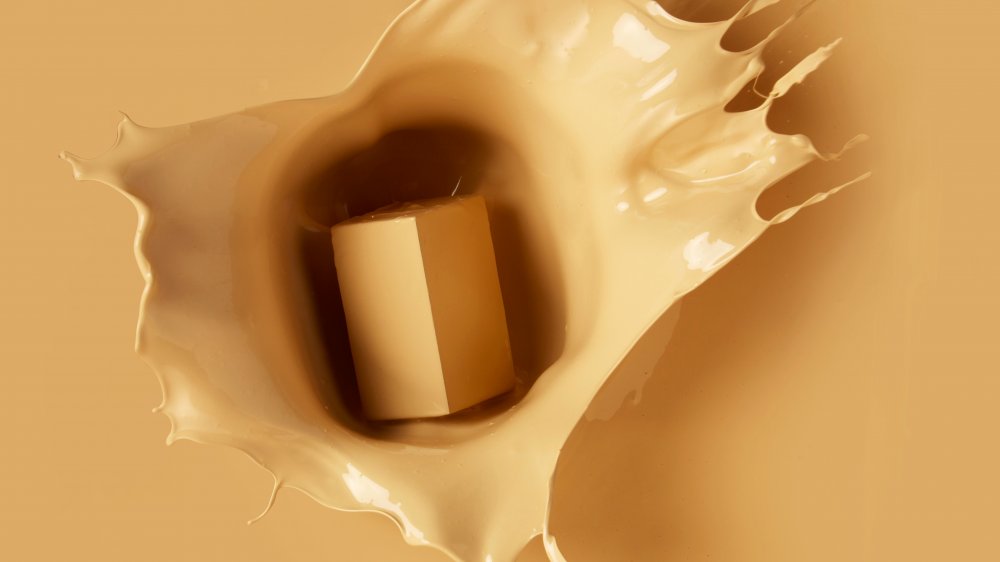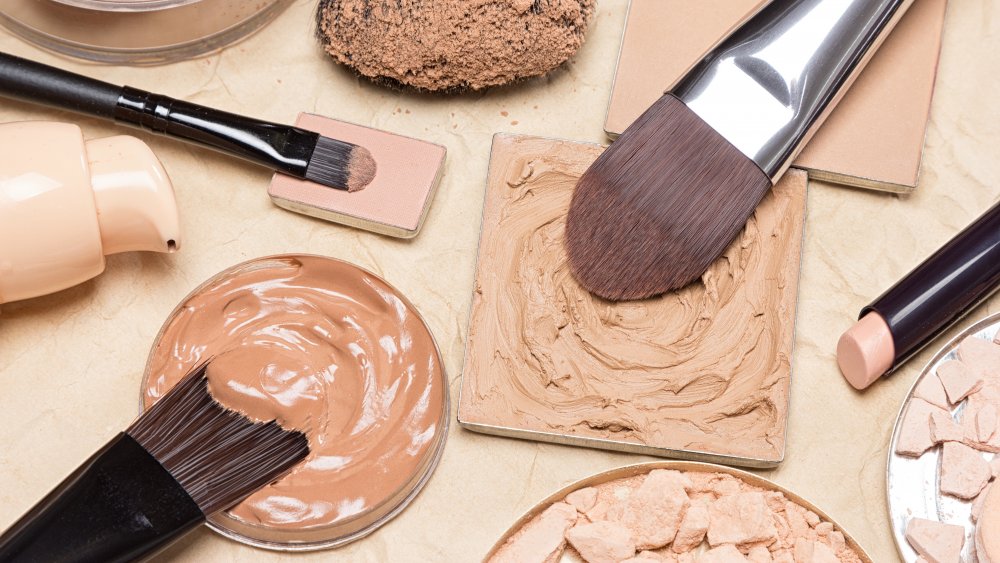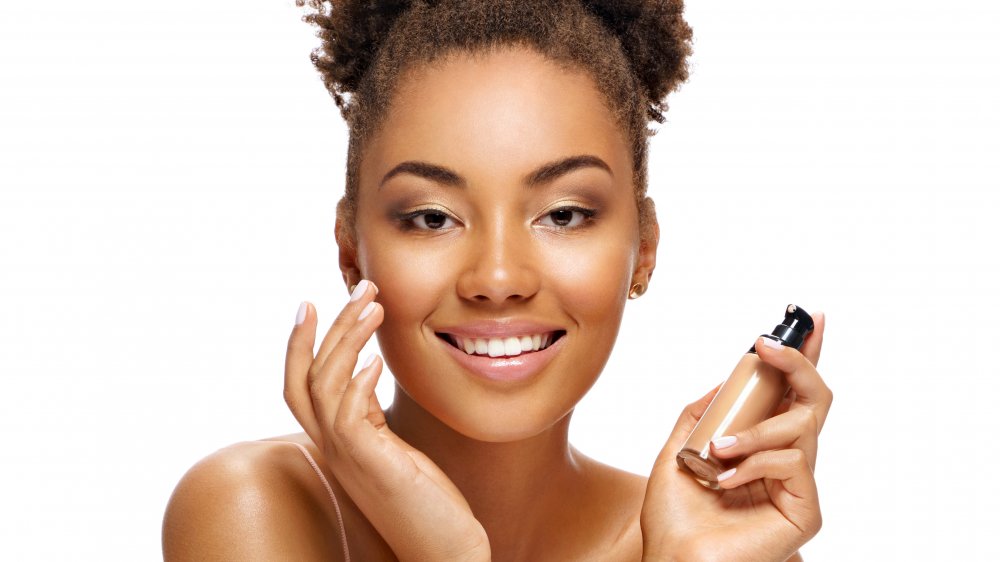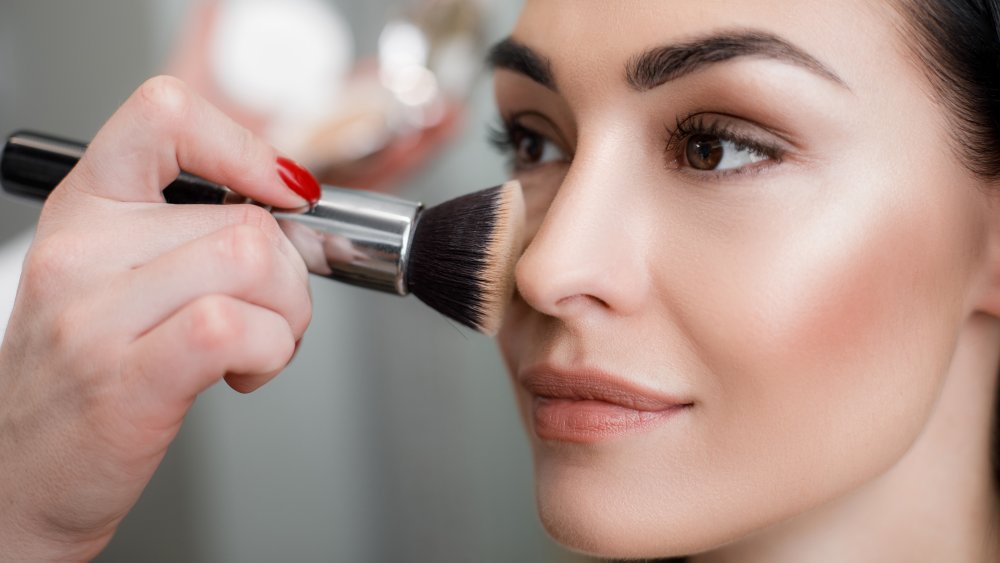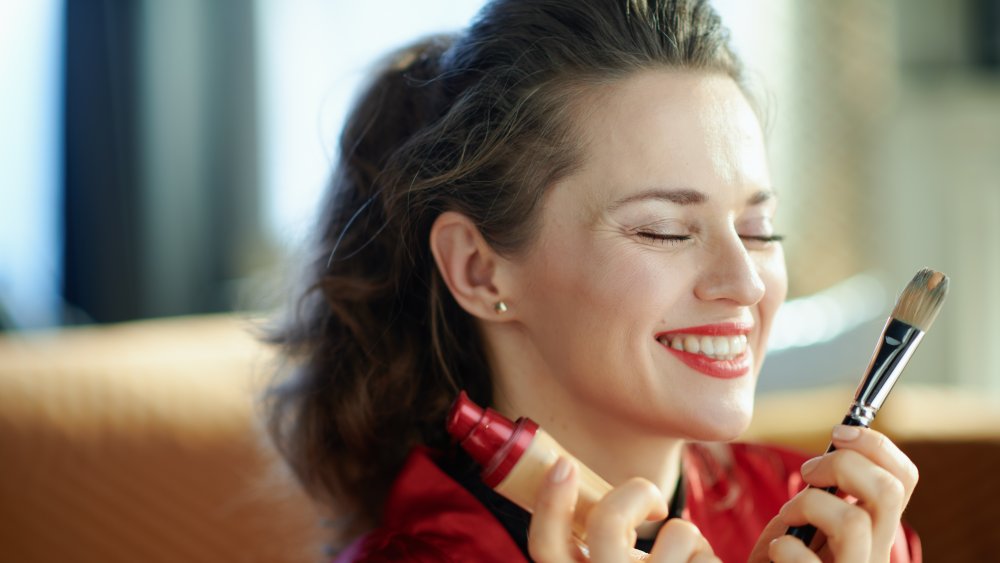Foundation Mistakes That Are Making You Look Old
We may receive a commission on purchases made from links.
Flawlessly applied foundation can make a world of difference. Of course, that's not to say you should use foundation to cover up your natural beauty. "Foundation isn't meant to completely obliterate your skin — it's there to even out your tone, conceal minor flaws, and create a canvas on which to build the rest of your look," celebrity makeup artist Lisa Eldridge told Huda Beauty. And once you see yourself with an even complexion and glowing skin, you may just feel like your best self. Nevertheless, there are certain foundation mistakes you can make that will have the opposite effect. Instead of looking youthful, you may end up looking way older than you actually are.
As your skin changes so, too, should your foundation routine. Otherwise, you're probably not doing yourself any favors. Here's a look at some of the most common foundation mistakes that are making you look older than your age — and how you can avoid them.
You'll look older if you don't moisturize before you apply foundation
As important as quality makeup and proper application is, your skin will never truly glow until you take care of it with good skincare products (and a good diet). Obviously, you should wash your face and use any other topical products necessary for your skin type, but don't skip out on hydrating your skin, too. Even if you buy the most expensive foundation in the world, if you don't moisturize before you apply it, you'll probably just end up looking older. And layering on the foundation is no substitute for moisturizer.
Jamie Coombes, a makeup artist for Dior, told Good Housekeeping, "Good hydration is key to a youthfully radiant complexion at any age." For older women in particular, makeup artist Gucci Westman recommends applying either "a hydrating moisturizer or a bit of face oil" just "prior to applying foundation." She continued, telling, Allure, "You can even dab in the foundation with a bit of the oil left on your fingers to add some extra moisture."
Not using primer before applying your foundation will make you look older
The world of skincare products and makeup can be really confusing; it truly does seem as though every other week there is a new must-have beauty product. But one thing that is truly important when it comes to skincare and helping your foundation look as great as possible is primer. Yes, it's another product to add to your regimen, but it's worth it, according to experts.
Not only does primer serve its own purpose for your skin, it also prevents any foundation mistakes that can make you look older than you are. "Primer can instantly help the skin look younger by filling in fine lines, wrinkles, and pores, and allowing foundation to go on more smoothly," Alejandro Falcon, a makeup artist and the artistic director for Osmosis Colour Cosmetics, told Women's Health. Primer's name basically says it all: It primes, or preps, your skin for makeup. Skipping the primer, then, is a no-no.
You'll look older if your foundation color doesn't match your skin tone
One of the hardest parts about buying makeup is finding products that work for your individual skin tone. It's tricky to match a concealer to your exact shade or find an eye shadow that looks good against your skin tone. It's arguably even more important, though, to find a foundation that matches your skin tone. If it doesn't, not only do you risk looking a bit like a clown, it can actually age you. This is especially true if you buy a foundation that is too light for your skin.
As makeup artist Sandy Linter told Allure, "Even if you have ivory skin, you need to go a little bit warmer as you get older." Otherwise, you risk highlighting any fine lines you may have. When choosing a slightly darker shade, make sure you also avoid the matte foundations. Makeup artist Chrisanne Davis told the publication,"A light-reflective formula makes the skin look like it's glowing." And who doesn't want their skin to glow, right?
Using too much foundation will cause you to look older
If you've ever tried to cover up a zit or dark spot on your face, you know all too well the perils of caking on makeup. It can easily end up in disaster. And while it's important to use enough foundation in order to make your skin look smooth and even, there is such a thing as too much product. When it comes to foundation, you want quality over quantity. If you brush on too much makeup, you won't look any younger. In fact, you'll end up looking older, according to Prevention.
"Trying to completely cover with too much product will make your complexion very dull and your makeup will look caked on," makeup artist and stylist Sophia Porter told Dermstore. Caked makeup will naturally settle into fine lines and wrinkles. Additionally, "the more skin you can see, the better," makeup artist Sandy Linter told Allure. When you pile on the foundation, not only can it dry out your skin and make it look flaky, but it can also be harder to adjust and remove.
You'll look older if you only use powdered foundation
There seems to be an endless stream of new brands, breakthrough technologies, and must-have make up products. But as intriguing as all those things can seem, there is one kind of foundation you should seek to avoid as your skin begins to age. According to The Zoe Report, powdered foundation can make you look older as it settles into wrinkles, making them look more pronounced.
According to Stephanie Koutikas, a makeup artist and the creative director at Mehron Makeup, "Most face powders tend to magnify lines in the skin, aging us." Koutikas continued, telling Byrdie, "If you can't give up powder, try switching to a sheer translucent powder or a mineral-based one."
Additionally, makeup artist for Dior, Jamie Coombes, told Good Housekeeping, "As we get older, heavier finishing powders can look overdone, accentuate pores, flatten the complexion and generally age us." As such, she recommends HD powder because it "will reduce shine, but keep the youthful radiance."
If you don't use the right tool to apply your foundation, you'll end up looking older
As important as it is to find the right kind — and use the right amount — of foundation for your skin, it's equally important to use the right tool to apply your foundation. This will help you blend evenly so you don't end up with splotches across your face that make you look like you just dropped out of beauty school, but there's more to it than that. Failing to blend with the right tool can end up making you look older.
"[Using your] fingers can look blotchy, uneven, or gloppy, which can make your lines come out more," celebrity makeup artist Nick Barose told Allure. Instead, the expert recommends using a sponge or, if you prefer, a foundation brush. What are you waiting for? Grab one of your favorite makeup brushes or sponges and get to work!
The way you blend your foundation may be making you look older
If you've ever looked at Kim Kardashian's contouring method and felt like you needed a degree in fine art to master it, you are not alone. Even if you don't want to become a contour pro, though, it's still important to know how to properly apply your foundation. If your foundation application technique is off, you'll end up looking older than you are, which is so not what Kim Kardashian would want, right?
Makeup artist and stylist Sophia Porter told Dermstore that "the incorrect application [of makeup] can affect how old a person looks." Additionally, if your skin is already showing signs of aging, Porter recommends changing up how you apply your foundation. "For more mature skin, I like to focus on the center of the face and blend outward to avoid making the foundation look like a mask," she said. Additionally, makeup artist Sandy Linter explained to Allure that after she applies foundation to the majority of the face, she likes to go back in with "concealer, plus maybe a touch of foundation under the eye area."
You'll look older if you use an orange-hued foundation
Anyone who has ever used makeup is familiar with the Oompa Loompa phenomenon. You know, when someone wears an orangeish shade of foundation, thus making them look like something out of Willy Wonka's chocolate factory. This look is, of course, not ideal — and it can actually make you look older.
As Southern Living reported, there are a few causes for this effect. The shade of foundation may be too far on warm side or too dark — or it could be a different reason entirely. Foundations can react to your skin's natural oils and actually oxidize, the publication revealed. When that happens, the foundation can start to change colors, most often turning into an orange tone.
Fortunately, Southern Living explained that oxidation and the resulting orange hue can be avoided by simply using a primer as a buffer between your skin and your foundation. And, of course, you'll want to avoid buying a foundation that looks too dark or warm. Regardless of your age, it's never a good look.
You'll look older if you use a foundation that contains parabens
When you go shopping for makeup, you've likely noticed a huge discrepancy in prices among the many makeup products — especially foundation products. You could spend $7 on a bottle of foundation or you could easily spend $60 on a bottle of the same size. Although it's possible to get a good foundation for not a ton of money, you'll want to pay close attention to the ingredients list on the back of all your products.
A 2006 study conducted by the Department of Biomedical Safety Science at Kyoto Prefectural University of Medicine in Japan found that the ingredient methylparaben — a kind of paraben commonly used in makeup, including foundation — can have a negative effect on your skin.
As Prevention explained of the study, methylparaben can react with UVB rays and literally speed up the aging process, making you look older and even permanently impacting your DNA. If that's not reason enough to check the ingredients list on your makeup products, what is?
Using a foundation with the wrong undertone will make you look older
Shopping for foundation can be complicated enough without considering undertones. But as overwhelming as it is, it's definitely important to pick the right undertone. As it turns out, if you don't use a yellow-toned foundation, you are seriously missing out on some perks.
Sure, it might sound strange to use a yellow tone of foundation, especially if you have a darker complexion and think a yellow-toned foundation will wash you out. However, the opposite is true. "Yellow warms up the skin," makeup artist Sandy Linter told Allure. "And the warmer your skin looks, the younger it looks. End of story." Obviously you can use bronzer or blush to warm up your skin, too, but the best place to start is with a foundation that has a yellow tone to it. However, the publication cautioned, "Not Big Bird yellow, just yellowish."
You'll look older if you use the wrong foundation formula for your skin type
Each person has their own skin type. Some people have oily skin while others are constantly dry. You might be dealing with acne while someone else is frustrated with dark spots. Your skin is unique to you and while it's important to take care of it with good skincare products, you can also take care of your skin by using the right foundation.
While you probably pay close attention to make sure your foundation matches your skin tone, it's arguably even more important to match your skin type. If you have dry skin, choose a moisturizing foundation formula that contains ingredients like glycerin, sodium hyaluronate, or dimethicone, according to Everyday Health. While powder has a tendency to cling to fine lines and wrinkles, thus making the wearer appear older, you can get away with powder if you have very oily skin, according to Carmindy, a makeup artist for TLC's What Not to Wear.
You may look older if you don't use a hydrating foundation
Even if you had very oily skin for years and could always handle a powder foundation, you may find that changing as your skin ages. As such, opting for hydrating foundation instead can shave off a few years.
Makeup artist and stylist Jules Annen told Dermstore that as you get older, your skin starts to dry out, which means "your makeup may flake, crack and look dull, thus making you look weathered." Ouch, no one wants to look weathered. However, Hannah Hatcher, global educator for Jane Iredale cosmetics, told Byrdie that if you still want to stick with powder, there are some options to keep your skin looking youthful, such as the BareMinerals Skin Perfecting Veil. It won't dry your skin or make you look older.
If you're facing adult acne and aging skin, you shouldn't necessarily rule out a hydrating foundation formula. The formula not only gives you a youthful glow, but it may not contribute to pimples. Overly dry skin, on the other hand, can actually lead to breakouts.
You'll look older if you rub your foundation into your skin
The way in which you apply your foundation to your skin is important, especially if you want to look younger. And really, who doesn't want to shave a few years off their age with a simple hack?
"Starting from the nose, press the foundation into your skin with a sponge or BeautyBlender and work the product outward towards your hairline," advised Women's Health. That's right, press the foundation. Makeup artist and stylist, Sophia Porter told Dermstore that when you put on foundation, it's important stick to patting it into your skin, as rubbing it could make it appear thicker and cakier on your skin — thus making you look older.
After pressing in your foundation with your sponge or brush, you'll want to go back in with your fingertips to pat some more, Amy Conway, BB Pro Artist at Bobbi Brown, told Good Housekeeping. "Nothing imitates skin more than your own hands, so by pressing the face gently this will melt the makeup into the face for an even more natural look." In the world of beauty, application is just as important as product quality.
Not using a foundation for aging skin will make you look older
You already know that there are about a million different foundation formulas out there, but if you aren't using an anti-aging formula, you're probably looking older than your actual age. That's right, the best way to look youthful is to find a foundation formula for aging skin that works for you.
In your 20s, you may not be thinking much about anti-aging products, but that's actually a great time to incorporate them into your beauty routine. "I recommend my patients to start incorporating anti-aging skin care products in their 20s and 30s, when our skin slowly starts to lose collagen," dermatologist Y. Claire Chang told HuffPost.
Hannah Hatcher, global educator for Jane Iredale cosmetics, told Byrdie, "As we age or go through hormonal changes ... our sebum production begins to slow, and for some of us, it might even feel like it has hit a total standstill." She continued, saying, "This is when looking at what type of foundation we select and the finish it provides is so important." Giorgio Armani's Designer Lift Foundation is a great place to start as "it visibly firms and tightens the skin to give it a smooth and lifted appearance," Kelli J. Bartlett, director of makeup artistry for Glamsquad, told Byrdie.
